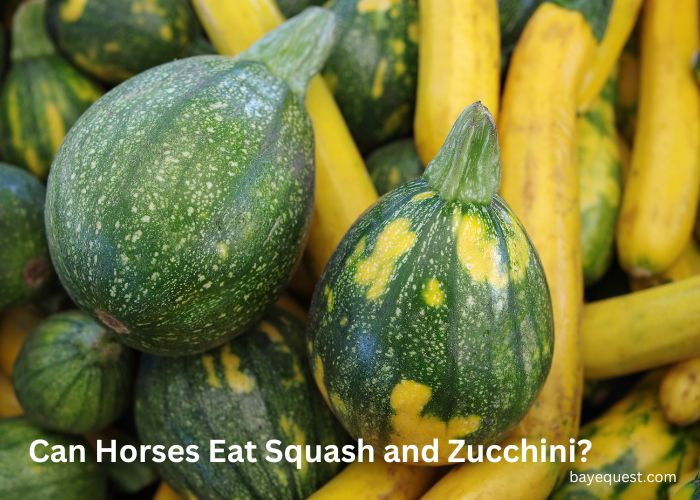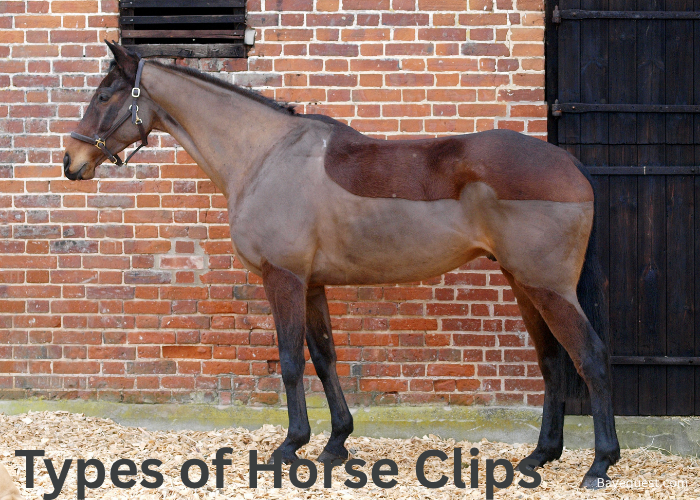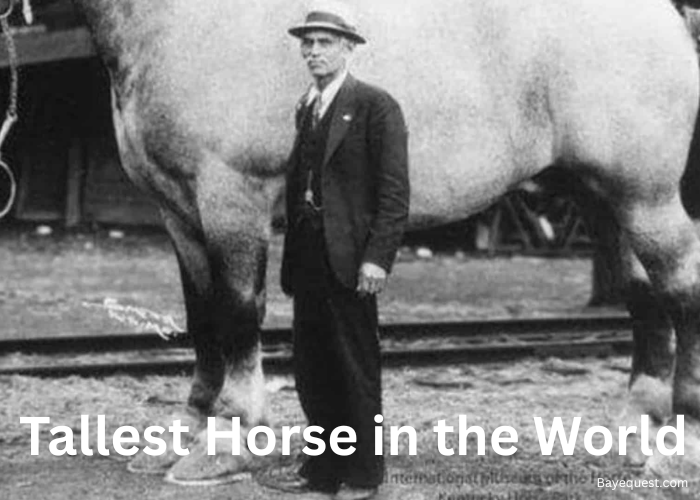Squash and zucchini are common staples in many kitchens, but can they also be a treat for your horse? You might be curious if these veggies are safe for your four-legged friend.
Horses can enjoy a variety of fresh produce, but it’s always good to know what’s safe and what’s not. In this post, we’ll break down whether squash and zucchini are good choices for your horse’s diet and how to feed them properly.
Let’s dive into the dos and don’ts of adding these veggies to your horse’s menu.
Can Horses Eat Squash and Zucchini? Key Takeaway
Yes, horses can eat squash and zucchini, including varieties like yellow squash and butternut squash. These vegetables provide beneficial nutrients when fed in moderation. However, avoid feeding horses processed forms such as zucchini bread or cookies. Always introduce new foods gradually to ensure they suit your horse’s digestive system.
What is Squash?
Squash is a vegetable that comes in many shapes and colors. You might know some types like butternut, acorn, and zucchini.
Squash is part of the gourd family related to cucumbers and melons. It can be eaten cooked or raw and is known for being healthy.
It’s packed with vitamins and often has a sweet or slightly nutty flavor. Plus, it’s super versatile in cooking, whether roasting it, blending it into soups, or slicing it up for salads.
Types of Squash
Squash comes in various types, each with its unique flavor, texture, and culinary use. Here are some of the most common types:
1. Butternut squash. Known for its sweet and nutty taste, butternut squash has smooth, beige skin and a bulbous shape. It’s great for soups, purees, and roasting.
2. Acorn squash. This variety is shaped like an acorn and has green skin with orange patches. It’s slightly sweeter than other winter squashes and works well baked or stuffed.
3. Spaghetti squash. When cooked, the flesh of this yellow squash pulls apart into strings that resemble spaghetti, making it a popular low-carb alternative to pasta.
4. Zucchini. A type of summer squash, zucchini has a mild flavor and can be eaten raw or cooked. It’s perfect for stir-fries, baking into bread, or grating into salads. (See also: Can Horses Have Banana Bread?)
5. Yellow squash. Similar in shape to zucchini but with a bright yellow color, this squash is slightly sweeter and can be used in many of the same dishes.
6. Kabocha squash. Also known as Japanese pumpkin, Kabocha has a sweet flavor and a texture that is a cross between a sweet potato and a pumpkin. It’s excellent for roasting or in curries.
7. Delicata squash. This squash is cylindrical and has a cream-colored skin with green stripes. Its flesh is tender and sweet, and the skin is edible, making it easy to prepare.
Read also: Can Horses Eat Butternut Squash?
Can Horses Eat Yellow Squash?
Yes, horses can eat squash. Squash is safe for horses and can be a nutritious addition to their diet. It’s packed with vitamins and minerals that can benefit their health.
However, as with any new food, introduce squash slowly and moderately to ensure your horse tolerates it well. So feel free to share squash with your equine friend as a tasty and healthy treat.
See also: Can Horses Eat Gourds?
Can Horses Have Zucchini?
Yes, horses can definitely eat zucchini. It’s a safe and healthy treat for them.
Zucchini is low in sugar and full of important nutrients. Like any new snack, start with a small amount to see how your horse likes it.
Zucchini can be a fresh addition to their diet if all goes well.
Can Horses Eat Zucchini Seeds?
Yes, horses can eat zucchini seeds. They are safe and shouldn’t cause any problems for most horses.
However, you must feed zucchini, including the seeds, in moderation as part of a balanced diet. Ensure the zucchini is fresh and clean before offering it to your horse to avoid any potential issues with contaminants or pesticides.
Can Horses Eat Zucchini Peels?
Yes, horses can eat zucchini peels. The peels are safe and a good source of fiber.
However, you must wash the zucchini to remove any pesticides or dirt before feeding it to your horse. You can feed the peels and the rest of the zucchini for a healthy treat.
Can Horses Eat Zucchini Leaves?
No, horses should not eat Zucchini leaves. While zucchini fruit and peels are safe, the zucchini plant leaves can contain cucurbitacins, which can be toxic and cause digestive upset in horses and other animals.
Feed your horse the zucchini fruit and avoid the leaves to keep things safe.
Can Horses Eat Butternut Squash?
Yes, horses can eat butternut squash. It’s a safe and nutritious option for them.
Butternut squash is rich in vitamins and minerals and can be a tasty treat for your horse. Like other new foods, it should be introduced gradually and prepared properly.
Feeding butternut squash in moderation is key to keeping your horse’s diet balanced.
Interesting read: Can Horses Eat Cucumbers?
How Much Squash Should Horses Eat?
For an average-sized horse (about 1,000 pounds), you can safely feed approximately 1 to 2 cups of chopped squash a few times a week.
This amount ensures that squash remains a treat and doesn’t disrupt the balance of the horse’s primary diet, which should be rich in forage. Maintaining this moderation is important to avoid any digestive upset.
How Much Zucchini Should Horses Eat?
For a horse that weighs roughly 1,000 pounds, you can offer 1 to 2 cups of chopped zucchini a couple of times per week. This quantity ensures that zucchini is enjoyed as a treat.
Keeping the servings limited to this amount helps maintain the horse’s overall health and digestive well-being.
Nutritional Content of Squash
Here’s a table that outlines the general nutritional content of various types of squash per 100 grams. The approximate values can vary based on the specific variety and growing conditions.
| Type of Squash | Calories | Carbohydrates (g) | Fiber (g) | Protein (g) | Vitamin A (IU) | Vitamin C (mg) | Potassium (mg) |
| Butternut Squash | 45 | 11.7 | 2.0 | 1.0 | 10631 | 21.0 | 352 |
| Acorn Squash | 40 | 10.4 | 1.5 | 0.8 | 367 | 10.0 | 347 |
| Spaghetti Squash | 31 | 6.9 | 1.5 | 0.6 | 135 | 2.1 | 108 |
| Zucchini (Courgette) | 17 | 3.1 | 1.0 | 1.2 | 200 | 17.9 | 261 |
| Yellow Summer Squash | 16 | 3.4 | 1.1 | 1.2 | 150 | 15.0 | 222 |
| Kabocha Squash | 49 | 12.0 | 2.7 | 1.0 | 1568 | 11.0 | 350 |
| Delicata Squash | 34 | 8.6 | 1.6 | 1.0 | 3100 | 10.0 | 230 |
Health Benefits of Feeding Squash to Horses
Feeding squash to your horse can be a real health booster. Here’s why it’s a good choice:
Low in sugar. Squash is low in sugar, which makes it a great treat, especially for horses that need to watch their sugar intake, like those with metabolic issues.
Rich in vitamins. It’s packed with vitamins like A and C. Vitamin A is great for their vision, immune system, and skin health. Vitamin C can help with stress and promote healthy aging.
Squash is a good source of fiber. It has a decent amount of fiber, which is essential for a healthy digestive system. It helps keep things moving smoothly in the gut.
Hydration. Since squash has a high water content, it can help keep your horse hydrated, adding a bit of variety to their usual water intake.
Minerals. It also provides essential minerals like potassium, supporting muscle and overall cellular function.
How to Incorporate Squash into Your Horse’s Diet
Incorporating squash into your horse’s diet can be a nutritious treat that adds variety. Here’s how to do it safely and effectively:
Choose the right squash. Opt for fresh, organic squash to avoid pesticides and chemicals if possible. Butternut, acorn, and spaghetti squash are all great options.
Preparation. Start by washing the squash thoroughly to remove any dirt or residues. Peel the hard-skinned squash, like butternut, to make it easier for your horse to eat. You can cook it to soften, but many horses enjoy it raw. Cut the squash into small, manageable pieces to prevent choking.
Remove seeds. While seeds from squashes like zucchini are safe, remove seeds from harder squashes to avoid any risk of intestinal blockage or discomfort.
Introduce slowly. Introduce squash to your horse’s diet gradually. Begin with small quantities to see how your horse reacts and ensure they can digest it without issues.
Monitor portion sizes. Squash should be fed as a treat, not as a diet staple. A few small pieces a couple of times a week is sufficient. Overfeeding can lead to digestive upset.
Mix it up. You can mix squash with other safe fruits and vegetables to create a varied and interesting diet for your horse. This also helps in providing a range of nutrients.
Consult your vet. Before adding new food to your horse’s diet, consult your veterinarian. They can provide guidance tailored to your horse’s nutritional needs.
How to Prepare Squash for Your Horse
Preparing squash for your horse is simple and straightforward. Here’s how you can do it:
Pick fresh squash. Choose a fresh squash that feels firm and has no soft spots or blemishes.
Wash it well. Give the squash a good wash to remove any dirt or chemicals from the skin.
Peel and remove seeds. Peel and scoop out the seeds of harder squashes like butternut. If the skin is clean, soft squashes like zucchini can be fed with it on.
Chop it up. Cut the squash into small, bite-sized pieces. This makes it easier for your horse to eat and helps prevent choking.
Serve raw or cooked. You can serve squash raw, which is crunchy and refreshing, or cook it if you want to soften it up a bit. Just make sure it cools down before feeding.
Read also: Do Horses Like Strawberries?
Types Of Squash That Are Unsafe For Horses
Most squash varieties are safe for horses to eat when prepared correctly and fed in moderation. However, caution is always necessary, particularly with less common types or parts of the squash plant.
These include:
Wild squash or gourds. These can be toxic to horses. Some wild varieties contain high levels of cucurbitacins, which are bitter compounds that can cause severe gastrointestinal distress and toxicity.
Ornamental squash. Often used for decoration, these types of squash are not bred for consumption. They may contain higher levels of cucurbitacins, making them hazardous if ingested by horses.
Squash plants. Parts of the squash plant itself, such as the leaves and stems, can be harmful. They might carry cucurbitacins or other irritants that could cause colic or other digestive issues in horses.
Horses that Shouldn’t Eat Squash
While squash can be a healthy treat for many horses, it might not suit certain conditions and situations. Here are some scenarios where you should avoid feeding squash to horses:
Horses with metabolic issues. Horses suffering from conditions like Equine Metabolic Syndrome or insulin resistance should have a carefully controlled diet. Even though squash is low in sugar, any change in diet should be monitored by a vet.
Horses are prone to colic. If a horse is prone to colic or has a sensitive digestive system, introducing new foods, including squash, should be done cautiously. Squash, especially in larger quantities, can potentially cause digestive upset.
Obese horses. For horses that are overweight or obese, it’s crucial to control their caloric intake. While squash is relatively low in calories, all treats should be considered in the overall diet plan.
Horses with allergies or food sensitivities. Although rare, some horses might develop allergies or sensitivities to squash. If you notice any allergic reactions, consult a vet and discontinue feeding squash.
Horses with dental issues. Squash, particularly raw and unpeeled, can be tough for horses with poor dentition. This could lead to further oral health issues or choking.
FAQs
Can horses eat pumpkins?
Yes, horses can eat pumpkins. They are generally safe and can be a healthy treat in moderation. Pumpkins are rich in fiber, vitamins, and minerals, which can benefit horses. However, removing the stem and seeds and cutting the pumpkin into smaller pieces is important to prevent choking.
Can horses eat meat?
No, horses should not eat meat. They are herbivores, meaning their digestive systems are designed to process plant material, not meat. Feeding meat to a horse can lead to serious digestive and health problems. Horses thrive on grass, hay, and some supplemental grains and vegetables.
Read also: Can a horse eat meat?
Can Horses Have Squash and Zucchini? Conclusion
So, can horses eat squash and zucchini? Absolutely. These veggies are safe and packed with good stuff to benefit your horse.
Just remember, like any treat, they should be given in moderation. Start small, watch how your horse reacts, and always prep the veggies properly.
Whether tossing in some zucchini slices or mixing a bit of butternut squash into their feed, you add variety and nutrition to your horse’s diet. So go ahead, let your horse enjoy these healthy snacks, and watch them thrive.








